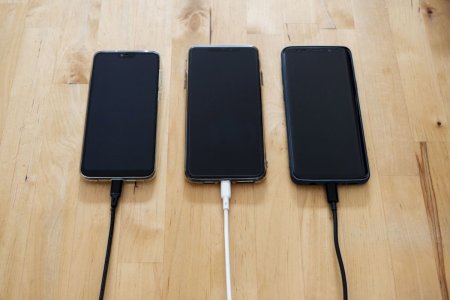Say Goodbye to Daily Charging: A New Microchip Could Make Your Smartphone Battery Last a Month!
By
Seia Ibanez
- Replies 4
How annoying is it when you need your phone for an important call or text, only to find out it's dead as a doornail because you forgot to charge it?
Unexpected low batteries can be a nuisance for a lot of us, especially since we depend on our smartphones to stay in touch with family and friends and keep up with the world.
However, the near future will potentially bring good news for our pockets and purses (not to mention our tired old charging cables!) as researchers are now developing a new type of microchip that could revolutionise battery life, extending it to an incredible 30 days or more.
As part of a $2.4 million two-year programme headed by the technology minister Paul Scully, a select few start-ups are being mentored to put Britain at the forefront of the semiconductor industry, including a Cambridge-based team that's working hard to create a microchip so efficient, devices could need recharging as little as once a month.
The team's commercial arm, Vaire, received a major investment for their efforts, which waives the need for a better battery and could extend existing smartphones and other devices' battery life for significantly longer than they usually last today.
'If they can really deliver on that outrageous claim,' said Sean Redmond, chief executive of SiliconCatalyst.UK, 'it means that you will have a mobile phone that will last a month, not a day’.
Mr Scully expressed that the technology developed by Vaire and the other 11 start-ups is truly ground-breaking and 'could truly change the way we live our lives'.
This could range from MintNeuro's invention of a 'tiny brain implant the size of a peppercorn' for treating conditions like Parkinson's and epilepsy to extending the battery life of smartphones.

The new low-energy chip could certainly take a lot of stress out of our lives. We won't need to worry about charging our devices obsessively or wasting money on new batteries.
And it could save you a lot of time and energy setting aside and packing up your cables and charging devices whenever you go out. Plus, it doesn’t hurt that we could potentially save money on electricity costs!
As exciting as the future of microchip technology is, it's just as crucial to consider the current state of smartphone battery life, an aspect that often leads to users' frustration. In this era of digital dependence, smartphones have evolved into more than just tools for communication - they are our navigators, our source of entertainment, our connection to the world, and essentially our everyday companions.

However, despite the grand strides made in enhancing these devices' functionalities, battery life continues to be a nagging issue, often unable to keep up with users' needs.
In the pursuit of dwindling form factors and increasing processing power, smartphone makers have put their devices on an exhausting treadmill. The constant push for high-resolution displays, sophisticated camera systems, powerful multi-core processors, and numerous background applications demand a significant amount of energy.
These continually evolving specifications have seemed to outpace advancements in battery technology, resulting in a daily requirement for users to recharge—if not more frequently.
The issue isn't limited to power-hungry functionalities and features; the software component also plays a critical role in determining battery life. Some applications can be battery-drainers, consuming energy even when seemingly idle. Additionally, operating systems and their updates can also significantly influence the battery lifespan, resulting in inconsistent battery performance.
To combat these limitations and enhance device usability, quick charging technology has gained prominence. However, this is only a workaround solution that masks the issue rather than resolving it. Several technology enthusiasts and experts have proposed solutions for this, such as advancing battery technology or discovering alternative power sources. Still, a universal, definitive solution has yet to be found.
It is the promise that new microchip technologies hold that is garnering significant attention and excitement from the tech industry and users alike. After all, the idea of not constantly worrying about that falling battery percentage and going weeks without needing a charge, now that's a real game-changer!

Right now, it's still early days for Vaire's microchip research, so there's a long way to go before the product hits the shelves. However, its potential holds exciting implications, and if all goes to plan, it could bring a wave of relief for a lot of us who tirelessly check our battery levels every day!
We’ll keep an eye out for new developments in the battery-life technology over the coming months. Are you interested in this new technology or does your phone battery last long enough for you?
Unexpected low batteries can be a nuisance for a lot of us, especially since we depend on our smartphones to stay in touch with family and friends and keep up with the world.
However, the near future will potentially bring good news for our pockets and purses (not to mention our tired old charging cables!) as researchers are now developing a new type of microchip that could revolutionise battery life, extending it to an incredible 30 days or more.
As part of a $2.4 million two-year programme headed by the technology minister Paul Scully, a select few start-ups are being mentored to put Britain at the forefront of the semiconductor industry, including a Cambridge-based team that's working hard to create a microchip so efficient, devices could need recharging as little as once a month.
The team's commercial arm, Vaire, received a major investment for their efforts, which waives the need for a better battery and could extend existing smartphones and other devices' battery life for significantly longer than they usually last today.
'If they can really deliver on that outrageous claim,' said Sean Redmond, chief executive of SiliconCatalyst.UK, 'it means that you will have a mobile phone that will last a month, not a day’.
Mr Scully expressed that the technology developed by Vaire and the other 11 start-ups is truly ground-breaking and 'could truly change the way we live our lives'.
This could range from MintNeuro's invention of a 'tiny brain implant the size of a peppercorn' for treating conditions like Parkinson's and epilepsy to extending the battery life of smartphones.

Smartphone users won’t need to charge batteries every now and then with the new low-energy chip. Credit: Pexels
The new low-energy chip could certainly take a lot of stress out of our lives. We won't need to worry about charging our devices obsessively or wasting money on new batteries.
And it could save you a lot of time and energy setting aside and packing up your cables and charging devices whenever you go out. Plus, it doesn’t hurt that we could potentially save money on electricity costs!
As exciting as the future of microchip technology is, it's just as crucial to consider the current state of smartphone battery life, an aspect that often leads to users' frustration. In this era of digital dependence, smartphones have evolved into more than just tools for communication - they are our navigators, our source of entertainment, our connection to the world, and essentially our everyday companions.

MintNeuro's invention of a 'tiny brain implant the size of a peppercorn' can help extend the battery life of smartphones. Credit: MintNeuro
However, despite the grand strides made in enhancing these devices' functionalities, battery life continues to be a nagging issue, often unable to keep up with users' needs.
In the pursuit of dwindling form factors and increasing processing power, smartphone makers have put their devices on an exhausting treadmill. The constant push for high-resolution displays, sophisticated camera systems, powerful multi-core processors, and numerous background applications demand a significant amount of energy.
These continually evolving specifications have seemed to outpace advancements in battery technology, resulting in a daily requirement for users to recharge—if not more frequently.
The issue isn't limited to power-hungry functionalities and features; the software component also plays a critical role in determining battery life. Some applications can be battery-drainers, consuming energy even when seemingly idle. Additionally, operating systems and their updates can also significantly influence the battery lifespan, resulting in inconsistent battery performance.
To combat these limitations and enhance device usability, quick charging technology has gained prominence. However, this is only a workaround solution that masks the issue rather than resolving it. Several technology enthusiasts and experts have proposed solutions for this, such as advancing battery technology or discovering alternative power sources. Still, a universal, definitive solution has yet to be found.
It is the promise that new microchip technologies hold that is garnering significant attention and excitement from the tech industry and users alike. After all, the idea of not constantly worrying about that falling battery percentage and going weeks without needing a charge, now that's a real game-changer!
Key Takeaways
- Scientists at Cambridge University are developing a microchip that could potentially allow smartphones to last a month before needing to recharge.
- Vaire, Cambridge University's commercial team, are backed by the government to help propel Britain's semiconductor industry.
- The microchip aims to create a silicon chip processor that requires little to virtually no energy to run, negating the need for a larger battery.
- Technology minister Paul Scully announced a $2.4m two-year programme to mentor select start-ups, contributing to Britain's research leadership in the semiconductor industry.
Right now, it's still early days for Vaire's microchip research, so there's a long way to go before the product hits the shelves. However, its potential holds exciting implications, and if all goes to plan, it could bring a wave of relief for a lot of us who tirelessly check our battery levels every day!
We’ll keep an eye out for new developments in the battery-life technology over the coming months. Are you interested in this new technology or does your phone battery last long enough for you?







